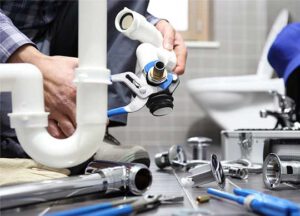Plumbers Woodland Hills install, repair, and fit plumbing fixtures in homes. They usually have extensive training through apprenticeship programs. These include educational hours on plumbing codes, regulations, blueprint reading, and physics.

They are also licensed by local governments. The main difference between them and commercial plumbers is that commercial plumbing deals with larger systems.
Plumbing systems are integral to any home or commercial building, and it’s important that they work efficiently at all times. This is where the services of a plumber come into play. Professionals who specialize in this type of work install, repair, and maintain water pipes, fixtures, and appliances like toilets, showers, sinks, and dishwashers. They also inspect and repair sewer lines, drains, and water heaters. The job is more hands-on than clerical, and it requires technical training and industry certifications.
Different types of plumbers focus on specific areas, so it’s important to know which type to call when you have a problem with your water system. Some professionals only handle residential plumbing while others focus on commercial systems. There are also some who specialize in both, so it’s helpful to find out which is the right fit for you before making a decision.
Residential plumbing involves the installation, maintenance and repair of a home’s water pipes and plumbing fixtures. This includes the kitchen, bathrooms, laundry rooms, and other household amenities like sprinkler systems. Residential plumbers are trained to troubleshoot and diagnose issues with plumbing mechanisms in homes and then fix them quickly and accurately. They are also skilled in installing and repairing septic systems and garbage disposal units.
Most plumbers receive their training through an apprenticeship, which combines classroom instruction and paid on-the-job training. Upon completion of an apprenticeship, most states require plumbers to obtain a license before working independently. Some plumbers choose to pursue additional education and certifications after gaining some experience in the field.
The plumbing industry is booming, and the demand for skilled professionals continues to rise. If you’re interested in becoming a plumber, you can start by checking out local colleges that offer certificate programs in plumbing technology and getting on-the-job training as an apprentice. You can then apply for a plumbing position in your area and begin your career.
Many people don’t give much thought to the type of plumber they hire for their repairs and installations, as long as the professional gets the job done quickly and correctly. However, choosing the wrong plumber can lead to more costly and inconvenient problems down the line.
They Troubleshoot Issues
Residential plumbers deal with a lot of smaller-scale issues that are specific to homes and households. This includes plumbing problems with toilets, drains and water heaters. They may also work on issues like clogged drains, sewer system backups and leaky pipes. When it comes to leaking pipes, it’s important to address the issue right away because it can lead to costly damage to your home. Water from leaking pipes can rot wood, cause metal to rust and create breeding grounds for bacteria and insects. In addition, a leaking pipe can cause flooding, which can also be a serious health hazard for your family.
Residential plumbing is a wide field, so it’s important for plumbers to have excellent trouble-shooting skills. This helps them pinpoint the source of the problem and make the necessary repairs. It’s also helpful for plumbers to be able to communicate with their customers and explain the issue in simple terms so it can be resolved quickly.
There are many differences between commercial and residential plumbing, but one of the biggest is that commercial systems are much more complex. For example, a grocery store has a very different plumbing system than a skyscraper, and it’s essential for a commercial plumber to understand the differences in order to fix any issues that might arise.
Another difference is that while residential plumbing deals with a variety of issues, it can be easier to pinpoint the source of the problem in a house. This is because homeowners use their plumbing systems regularly, so it’s easier to see small leaks or other issues that might not be noticeable otherwise. Commercial plumbing, on the other hand, can be more challenging because there are often more moving parts in a building.
This is why it’s important for residential plumbers to have excellent trouble-shooting and communication skills. They need to be able to understand the complexity of larger plumbing systems and find the source of the problem quickly so it can be fixed before it gets worse.
They Repair Water Heaters
Many people get confused about who to call when they have a plumbing issue. A plumber works on plumbing systems, while HVAC technicians work on heating and cooling systems. This confusion often arises when it comes to water heaters, because they can be considered either part of the plumbing system or the heating and cooling system. To help clear up any confusion, here is an explanation of how residential plumbers repair water heaters.
One of the most common issues that residential plumbers repair is water leaks. Leaking pipes can lead to serious water damage, so it’s important for homeowners to catch these issues as soon as possible. There are a few signs to look for that can indicate that you have a leak. For example, if you notice that your water has an unusual smell or is discolored, this may indicate that there is an issue with your plumbing.
Another common residential plumbing issue is clogged drain lines. This is often caused by hair, soap scum, and other debris that can build up over time. Fortunately, residential plumbers have the tools and knowledge to quickly and effectively unclog drain lines.
Water pressure issues are also very common for residential plumbing systems. High water pressure can cause damage to pipes and fixtures, so it’s important for homeowners to have a plumber install a pressure regulating device. This will ensure that the water in their home is at a safe pressure level.
Residential plumbers can also help with other household issues, such as installing or repairing garbage disposals and toilets. In addition, they can inspect sprinklers and other irrigation equipment to make sure that they’re working properly. They can also assist with sewer cleaning, which is a necessary service for keeping sewage systems clean and free from contaminants.
Residential plumbers must be licensed to work in their field. The licensing process varies by state, but most require an apprenticeship, training under a master plumber, and passing a certification test. Additionally, some states require continuing education for licensed plumbers to keep up with industry changes.
They Install Toilets
The toilet is one of the most used fixtures in a home. As such, it can be prone to issues like clogging and overflowing. This is why it’s important to set up proper waste disposal management and schedule regular maintenance with a licensed plumber to avoid these problems.
A residential plumber is tasked with installing, repairing, and maintaining toilets in homes and housing blocks. They also install water heaters and other plumbing appliances. However, they don’t work on commercial structures. This is because the responsibilities and demands of commercial plumbing are significantly different from those of residential plumbers.
One of the biggest differences between commercial and residential plumbing is that commercial buildings typically have a much larger infrastructure. This can include more floors, sinks, toilets, and urinals than a typical home or apartment building. As such, the plumbing systems are more complex and require specialized knowledge and equipment to repair.
Additionally, commercial plumbing systems often experience a higher volume of use than residential ones. As such, they are more prone to wear and tear and may need more frequent repairs and replacement parts. This can make the job more challenging and stressful for a plumber, especially if they aren’t familiar with the system.
A licensed plumber has the training, tools, and specialized equipment to handle these tasks more efficiently. Furthermore, they have the experience to notice potential problems like leaks under the floor or behind walls that a homeowner might not see. This can lead to costly damage and health hazards if left untreated.
While both types of plumbing have their pros and cons, the decision ultimately comes down to what type of career you want. If you enjoy working with people and solving problems, then residential plumbing might be the right choice for you. But if you want to work on bigger projects and earn more money, then the commercial path might be better. In either case, it’s important to research both careers thoroughly before making a final decision. By doing so, you can ensure that you are making the best decision for your career and future.

